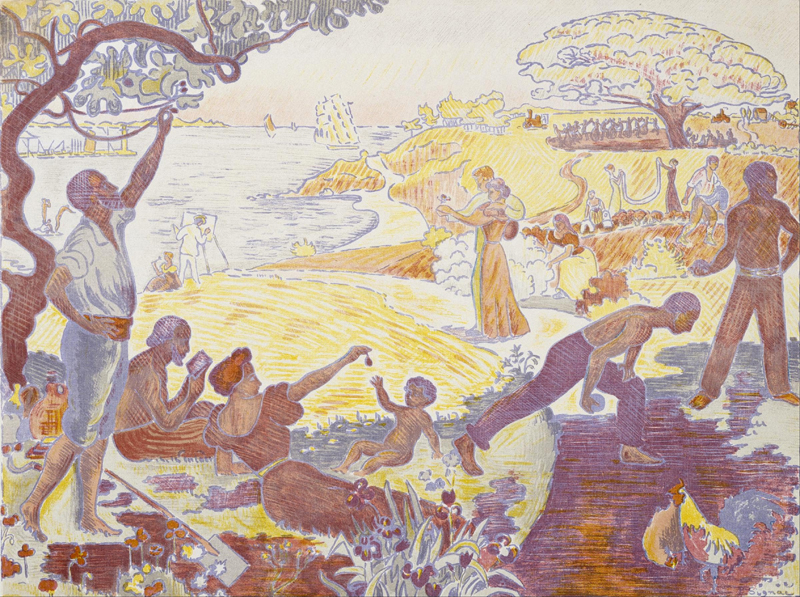
In the Time of Harmony:
The Joy of Life--Sunday by the Sea
Paul Signac, 1896
My dear friends,
In today's reading from Ephesians 2:11-22, we find a verse that appears to contradict one of the sayings of Jesus, namely:
with its commandments and ordinances,
that he might create in himself
one new humanity in place of the two,
thus making peace….
- Ephesians 2:15
"Do not think that I have come
to abolish the law or the prophets;
I have come not to abolish
but to fulfill."
- Matthew 5:17
To reconcile these two statements, we must journey to the roots of the text. The Greek verbs katargeo (καταργέω) and kataluo (καταλύω), both translated as "abolish" in these verses, are our keys. Katargeo, found in Ephesians 2:15, means "to render inoperative" or "to make of no effect." Kataluo, found in Matthew 5:17, signifies "to destroy" or "to dismantle." Here, we find the subtle distinction that can resolve the apparent contradiction.
When we understand katargeo as meaning "to render inoperative," we can see that Ephesians 2:15 is not saying the law has been destroyed or erased, but rather, its binding power has been transformed. The law, with its commandments and ordinances, is not negated but transcended in Christ.
Similarly, in Matthew 5:17, Christ is affirming that he has not come to destroy or dismantle the Law or the prophets, that is, the traditional teachings of the Hebrew Bible. Instead, he has come to fulfill them, to bring those teachings to fruition.
The key to reconciling these verses is understanding that Christ's fulfillment of the law is not a destruction but a transformation, a movement from the letter of the law to the spirit of the law. He elevates the law from a set of external commandments to an internal state of being, from judgment to grace, from division to unity, creating a new humanity at peace with itself.
As we reflect on this teaching in our own spiritual journey, we should remember that the ultimate goal of all spiritual paths, whether Christianity, Buddhism, or others, is not merely to adhere to a set of doctrines or rules but to transform ourselves, to embody the spirit of compassion, peace, and unity.
The Buddha taught the Middle Way, a path avoiding extremes and leading to enlightenment. Similarly, Christ, in fulfilling the law, teaches us a path beyond mere legalistic adherence, a path leading to the manifestation of divine love and unity.
In these challenging times, let us remember this teaching. Let us not cling rigidly to the letter of our own beliefs, but strive to embody their spirit, to live in a way that promotes peace, compassion, and understanding. For in doing so, we partake in the creation of this "new humanity" envisioned by Christ and move closer to the enlightened state described by the Buddha.
May the Spirit of love, compassion and wisdom guide us on this journey.